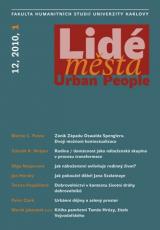Jak pokoušel ďábel Jana Szalatnaye
Několik poznámek k proměnám vztahu „já“ k sobě samému v rámci české evangelické tradice
DOI:
https://doi.org/10.14712/12128112.3625Klíčová slova:
Lukáš Martinovský, Havel Žalanský, Jan Szalatnay, Protestantism, theorising the SelfAbstrakt
The study is based on an analysis of moralist treatises of Czech Protestant pastors from the turn of the 16th and 17th centuries (Lukáš Martinovský, Havel Žalanský) and on an analysis of the autobiography of a Calvinist pastor from the turn of the 18th and 19th centuries (Jan Szalatnay). First, it pays attention to methodological questions. The gist of the article is the issue of the ratio between discursive analysis on one hand and the interpretation of cultural contents on the other. Furthermore, the article pays attention to the content of the analysed texts. In this sense, it chiefly analyses the way Jan Szalatnay describes temptation by the devil. For him, it has the character of possibly yielding to superstition in the sense of a sacral ritual, and furthermore, surprisingly, rather a civil form taking on gossip, discredit or red tape. In comparison with literature from the turn of the 16th and 17th centuries, Szalatnay lacks the motive of temptation in the form of sensuality, etc. The article also pays attention to the gradual origin of an “optimistic anthropology” in the works of the generation of authors represented by Johan Valentin Andreae and Jan Amos Komenský, and which represented in this analysis by the author Martinovský. The analysed text by Lukáš Martinovský shows how gradually the inner space of the soul, where the Self can take an inward step away from outer stimulation, is constituted on the discursive level, as well as on the level of thought and cultural categories.
Stahování
Publikováno
Jak citovat
Číslo
Sekce
Licence

Tato práce je licencována pod Mezinárodní licencí Creative Commons Attribution-NonCommercial-NoDerivatives 4.0.


